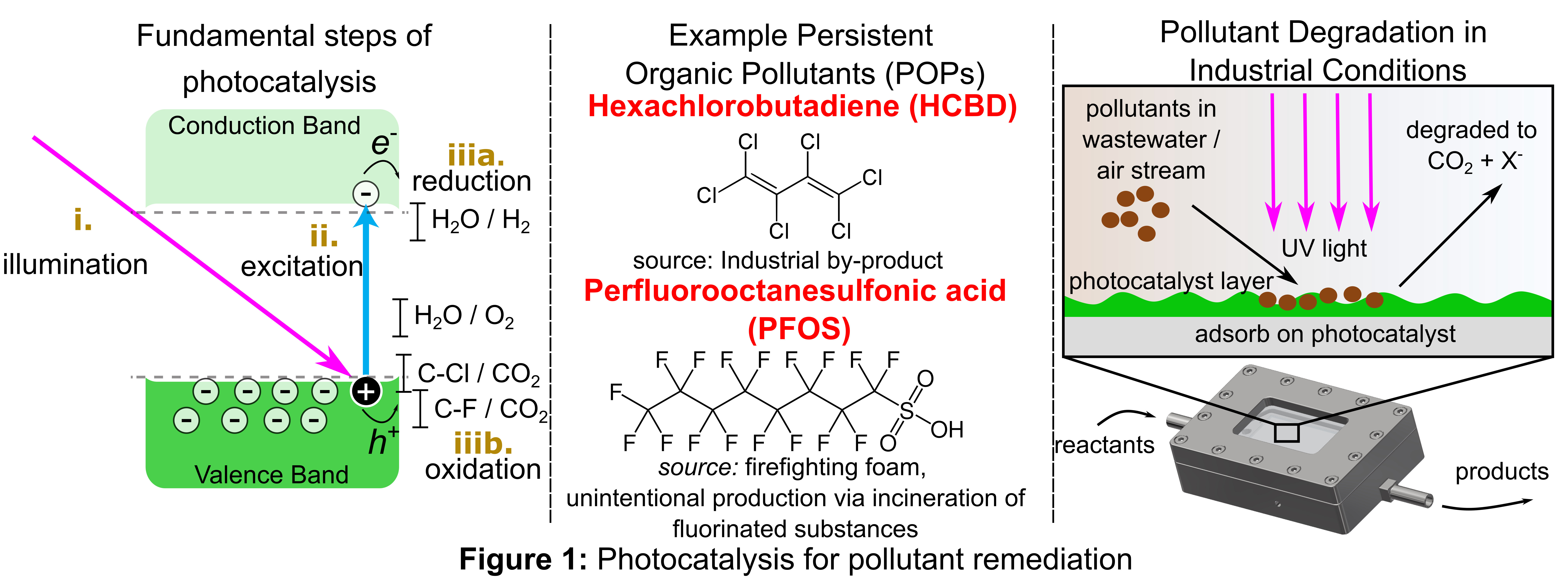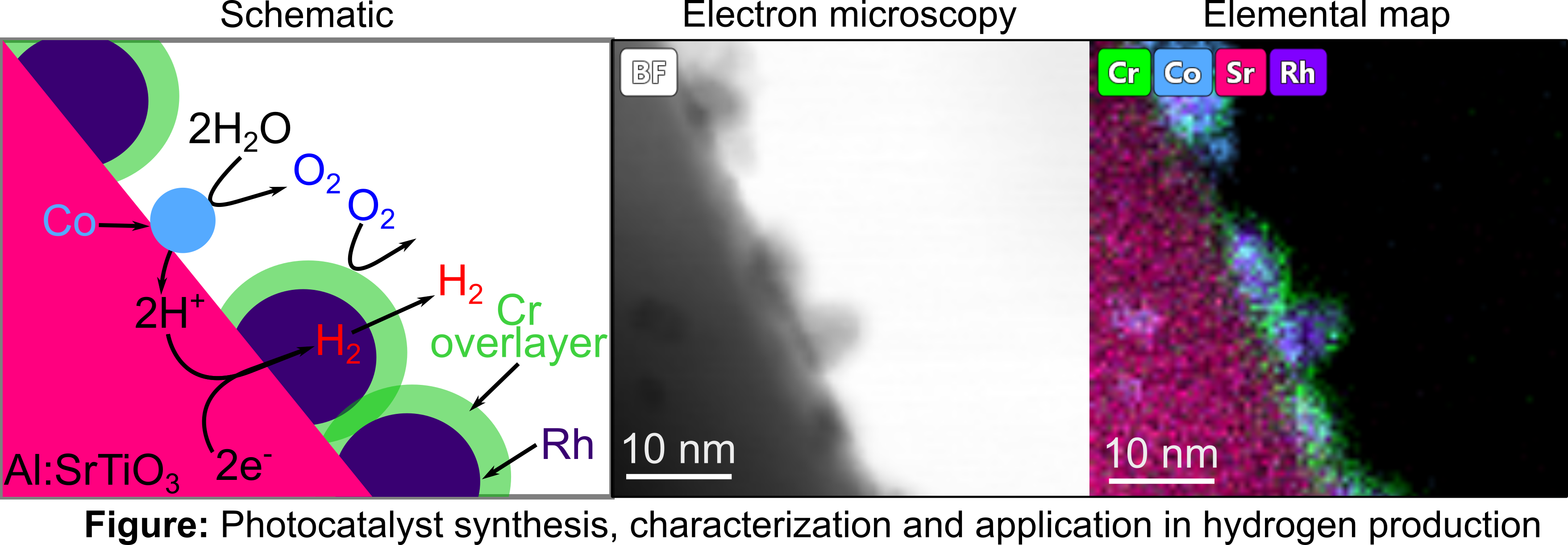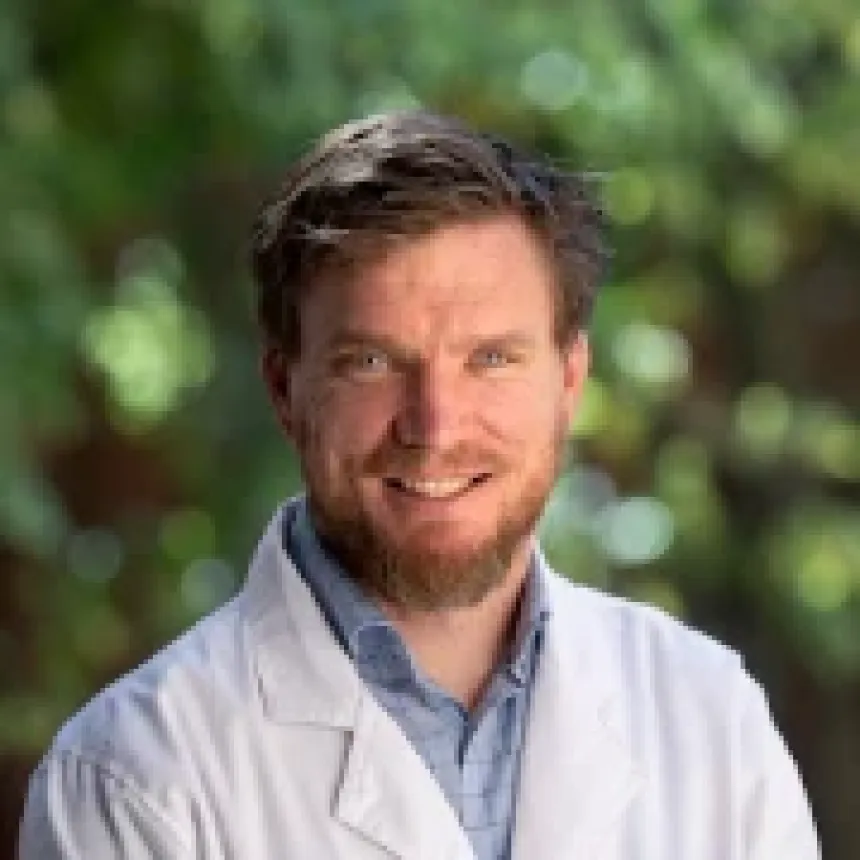Dr Cameron Shearer
Lecturer
School of Physics, Chemistry and Earth Sciences
College of Sciences
I use surface chemistry to solve environmnetally relevant problems. Our group page is on LinkedIn. Currently we have research projects on hydrogen evolution and persistent organic pollutant (including PFAS) remediation.
Career Snapshot:
2012 - PhD, Flinders University of South Australia, Carbon nanotube modified surfaces for water filtration, gene transfection and as electron sources.2012-2014, Postdoctoral Research Associate, University of Muenster (Germany), Photocatalytic hydrogen production using metal oxide coated carbon nanotubes.2014-2015, Researcher in Business, PMB Defense Engineering and Flinders University, Submarine battery lifetime2015-2017 ARC Resarch Associate, Flinders University, Carbon nanotube photovoltaics2018 -2019, University of Adelaide Research Fellow, Nanostructured photocatalysts for energy conversion2019-2020, Researcher in Business, Membrane Systems Australia and UniSA, Large-scale PFAS remediation2020-2024, ARC Future Fellow, University of Adelaide, Light-driven degradation of persistent organic pollutants
2025 - , Lecturer in Sustainable Chemistry, The University of Adelaide, Light-driven degradation of persistent organic pollutants and generation of hydrogen
I aim to use fundamental chemistry and materials science to find solutions to environmentally relevant problems such as the destruction of pollutants or the generation of renewable fuels.
Sunlight is the most abundant energy source on Earth yet it is still underutilized in chemical synthesis. Photocatalysis is the key to unlock the potential of light in a range of applications.
Photocatalytic degradation of persistent organic pollutants (POPs)
Persistent organic pollutants (POPs) can cause cancer and birth defects in humans and are destructive to animal and aquatic lifeforms.[1, 2] POPs are by-products of some agricultural and industrial processes and do not degrade naturally due to their strong chemical bonds (e.g. C-Cl, C-F) which are resistant to chemical- and bio-degradation (example POPs are shown in Figure 1).

There is a need to develop methods and processes for effective degradation of POPs to mitigate their emerging health and environmental effects.
I synthesise of new photocatalytic materials with designed electronic band structure to break C-Cl or C-F bonds (which are present in all POPs). Materials of interest are titanium and tantalum based perovskites such as SrTiO3 and NaTaO3.[3]
Recently, we have started to work on various metal sulfides which have shown excellent potential for the degradation of PFAS.[4, 5]
A final aspect of this research is the translation of research to commercial application and photocatalytic processes and reactors will be developed with close ties to industry to degrade pollutants relevant to Australia (Figure 1).
Our research in PFAS degradation has been highlighted by ABC Australia.
Team member Mabel Day has created a 3 minute video describing her research:
Hydrogen production via photocatalytic water splitting
Hydrogen can be produced directly from water and produces only water when burned, making it a completely renewable and non-polluting fuel source that could replace fossil fuels. However, current methods to produce hydrogen requires a significant amount of energy and it is still not economically competitive with oil and gas.
My research aims to produce light absorbing materials which can produce hydrogen (H2) from water (H2O) using only energy from sunlight to drive the reaction.
To achieve this, We prepare metal oxides which absorb light, store the energy, and then use the energy to split water.[6, 7] This process is enhanced with co-catalysts to drive hydrogen evolution or oxygen evolution. These co-catalysts are often rare and expensive materials (platinum or rhodium), so we deposit few-atom cluster co-catalysts which we find improve performance and reduce the amount of precious materials used.[8, 9, 10]
My research in reducing the cost of hydrogen production materials is shown in the video:
High resolution transmission electron microscopy (TEM) is used to observe the materials at the atomic scale.

| Date | Position | Institution name |
|---|---|---|
| 2025 - ongoing | Lecturer in Sustainable Chemistry | University of Adelaide |
| 2020 - 2024 | ARC Future Fellow | University of Adelaide |
| 2019 - 2020 | Researcher in Business | Membrane Systems Australia and University of South Australia |
| 2018 - 2019 | Research Fellow | University of Adelaide |
| 2015 - 2017 | ARC Research Associate | Flinders University |
| 2014 - 2015 | Researcher in Business | PMB Defense Engineering and Flinders University |
| 2012 - 2014 | Postdoctoral Research Associate | University of Muenster |
| Date | Type | Title | Institution Name | Country | Amount |
|---|---|---|---|---|---|
| 2019 | Fellowship | ARC Future Fellow | Australian Research Council | Australia | - |
| 2018 | Award | South Australian Young Tall Poppy | Australian Institute of Policy & Sciences | Australia | - |
| 2017 | Research Award | International Synchrotron Access Program | Australian synchrotron | - | $6,400 |
| 2016 | Award | Flinders University Vice Chancellor’s Award for Early Career Researchers | - | - | $2,500 |
| 2015 | Award | Australia-China Young Scientist Exchange Program | ATSE | Australia | ~$10,000 |
| 2015 | Achievement | Business Pitch Competition at the Nanotechnology Entrepreneurship Workshop for Early Career Researchers | - | - | $1000 |
| 2012 | Award | South Australian PhD Research Excellence award | - | - | $10000 |
| 2009 | Achievement | ARNAM student scholarship for collaborative research | - | - | $3,500 |
| Date | Institution name | Country | Title |
|---|---|---|---|
| 2008 - 2012 | Flinders University | Australia | PhD |
| 2003 - 2007 | Flinders University | Australia | BSc (Honours) |
| Year | Citation |
|---|---|
| 2020 | Shearer, C. J., Yu, L. P., & Shapter, J. G. (2020). Optoelectronic properties of nanocarbons and nanocarbon films. In J. -C. Arnault, & D. Eder (Eds.), Synthesis and Applications of Nanocarbons (pp. 275-294). Wiley. DOI Scopus3 |
| 2019 | Yu, L., Batmunkh, M., Shearer, C., Shapter, J. G., & Shapter, J. G. (2019). Use of Carbon Nanotubes (CNTs) in Third‐Generation Solar Cells. In S. K. Kurinec (Ed.), Emerging Photovoltaic Materials: Silicon & Beyond (pp. 551-609). Beverly, MA, USA: Scrivener Publishing. DOI |
| 2018 | Yu, L., Batmunkh, M., Shearer, C., & Shapter, J. G. (2018). Use of Carbon Nanotubes (CNTs) in Third-Generation Solar Cells. In Emerging Photovoltaic Materials Silicon and Beyond (pp. 553-609). DOI Scopus1 |
| 2017 | Batmunkh, M., Grace, T., Shearer, C., Tune, D., Yu, L., Mark, M., . . . Shapter, J. (2017). Use of Carbon Nanotubes in Third-Generation Solar Cells. In H. Peng, Q. Li, & T. Chen (Eds.), Industrial Applications of Carbon Nanotubes (pp. 201-249). Amsterdam: Elsevier. DOI Scopus7 |
| 2016 | Cherevan, A., Gebhardt, P., Shearer, C., & Eder, D. (2016). Nanocarbon hybrid materials. In K. D. Sattler (Ed.), Carbon Nanomaterials Sourcebook: Nanoparticles, Nanocapsules, Nanofibers, Nanoporous Structures, and Nanocomposites (Vol. 2, pp. 625-646). USA: CRC Press. |
| 2016 | Shearer, C. (2016). Biosensor-Based Membrane. In Encyclopedia of Membranes (pp. 247-248). DOI |
| 2016 | Shearer, C. (2016). Porous Silicon. In Encyclopedia of Membranes (pp. 1627-1629). DOI |
| 2016 | Shearer, C. (2016). Biointerface. In Encyclopedia of Membranes (pp. 237-238). DOI |
| 2016 | Shearer, C. (2016). Aligned Carbon Nanotube. In Encyclopedia of Membranes (pp. 52-54). Springer Berlin Heidelberg. DOI |
| 2014 | Shearer, C., & Eder, D. (2014). Synthesis strategies of nanocarbon hybrids. In D. Eder, & R. Schloegl (Eds.), Nanocarbon-inorganic hybrids: Next generation composites for sustainable energy applications (pp. 125-170). Berlin: Walter de Gruyter GmbH. DOI Scopus3 |
| 2014 | Shearer, C., Cherevan, A., & Eder, D. (2014). Application of functional hybrids incorporating carbon nanotubes or graphene. In K. Tanaka, & S. Iijima (Eds.), Carbon nanotubes and graphene: edition 2 (2 ed., pp. 387-433). Amsterdam: Elsevier. DOI Scopus19 |
| Year | Citation |
|---|---|
| 2025 | Toyota, Y., Sanada, Y., Day, M., Matthews, R., Shearer, C., & Kobayashi, Y. (2025). Near-ultraviolet and visible-light decomposition of perfluoroalkyl compounds by copper-doped zinc sulfide nanocrystals. DOI |
| 2025 | Day, M., Hamza, M., & Shearer, C. (2025). Aliovalent Doping of SrTiO3 for Photocatalytic Pollutant Remediation. DOI |
| 2025 | University of Adelaide Environment Institute Research Funding Scheme – Collaborative Project with KU Leuven for Ultrasonic degradation of PFAS | $6,000 |
| 2025-2028 | Australian Research Council Discovery Project DP250103235 “Advanced catalytic reduction to breakdown fluorinated pollutants” | $639,889 |
| 2025 | Channel 7 Children's Research Foundation 45642590 “Understanding PFAS: the ‘forever chemical’ that causes fetal anomalies and a lifetime of poor health” | $100,000 |
| 2024-2026 | Industry Contract Research - Petronas Research “Computational selection and experimental investigation of a photocatalytic system capable of generating H radicals from hydrogen donor molecules” |
$1,270,000
|
| 2023-2024 | Industry Contract Research Funding – Enviropacific Services “Development of Per- and Polyfluorinated Substances (PFAS) treatment chain” | $239,916 |
| 2023-2024 | UoA Sustainability FAME Strategy Accelerate Grant “ Future proofing remediation of perfluoroalkyl substances (PFAS)” | $100,000 |
| 2023-2024 | Australian Research Council LIEF LE240100129 “State-of-the-art atomic force microscopy facilities for South Australia” | $530,721 |
| 2022-2023 | Australian Research Council LIEF LE230100168 “Materials for Sustainability Analysis Facility” | $620,000 |
| 2022 | UoA Faculty of Sciences Research Roadmap Grant Scheme “A self-driving laboratory for rapid, automated optimisation of pollutant remediation” | $34,000 |
| 2021-2022 | Robinson Research Institute Innovation Seed Funding Program “Understanding PFAS: the ‘forever chemical’ that permanently changes fertility” | $50,000 |
| 2021 | UoA Digi+ FAME Strategy Internal Initiate Grant “Bridging Critical Minerals and Quantum Materials for Emerging Future industries” | $20,000 |
| 2020-2024 | Australian Research Council Future Fellowship FT190100854 – “Light driven degradation of persistent organic pollutants” | $714,000 |
| 2019-2022 | Australian Research Council Special Research Initiative SR180200051 – “Integrated platform technologies for remediation of PFAS contaminated water” | $647,638 |
| 2019-2020 | Innovation Connections Grant ICG001107 – “PFAS Benchtop destruction” | $235,000 |
| 2019-2020 |
Australian Solar Research Institute – Solar Fuels project “ Concentrated Solar Photocatalysis” |
$300,000 |
| 2020-2024 | Future Fuels CRC Research Project (FFCRC RP01) “Solar Photocatalytic Hydrogen Production” | $313,000 |
| 2018-2019 | University of Adelaide Beacon Research Fellowship for Early Career Researchers | $130,000 |
| 2017 | Australian Synchrotron, International Synchrotron Access Program | $6,400 |
| 2016 | Flinders University Vice Chancellor’s Award for Early Career Researchers | $2,400 |
| 2015 | Australia-China Young Scientist Exchange Program | ~$10,000 |
| 2009 | ARNAM student scholarship for collaborative research | $3,500 |
| 2008-2011 |
Australian Postgraduate Award (APA) scholarship for PhD stipend
|
~$80,000 |
(updated 13/10/2025)
Chemical Kinetics, Redox Chemistry, Atmospheric Chemistry, Electrochemistry, Organic contaminants and their remediation, sub-nano assemblies
| Date | Role | Research Topic | Program | Degree Type | Student Load | Student Name |
|---|---|---|---|---|---|---|
| 2025 | Principal Supervisor | Advanced catalytic reduction processes for the breakdown of fluorinated pollutants | Doctor of Philosophy | Doctorate | Full Time | Mr Alexander James Keltie |
| 2025 | Principal Supervisor | Development of visible light active photocatalysts for hydrogen production and environmental remediation | Doctor of Philosophy | Doctorate | Full Time | Mr Thomas James O'Dea |
| 2025 | Co-Supervisor | Degradation of persistent chemicals in the environment | Doctor of Philosophy | Doctorate | Full Time | Miss Zixin Hu |
| 2025 | Principal Supervisor | Development of visible light active photocatalysts for hydrogen production and environmental remediation | Doctor of Philosophy | Doctorate | Full Time | Mr Thomas James O'Dea |
| 2025 | Co-Supervisor | Degradation of persistent chemicals in the environment | Doctor of Philosophy | Doctorate | Full Time | Miss Zixin Hu |
| 2025 | Principal Supervisor | Advanced catalytic reduction processes for the breakdown of fluorinated pollutants | Doctor of Philosophy | Doctorate | Full Time | Mr Alexander James Keltie |
| 2024 | Principal Supervisor | Tantalum-Based Metal Oxides for the Photocatalytic Degradation of Per- or Polyfluoroalkyl Substances (PFAS) | Doctor of Philosophy | Doctorate | Full Time | Miss Rachael Kate Matthews |
| 2024 | Co-Supervisor | Computational selection and experimental investigation of a photocatalytic system capable of generating H radicals from hydrogen donor molecules | Doctor of Philosophy | Doctorate | Full Time | Mr Zi Kang Koi |
| 2024 | Principal Supervisor | Light Initiated Environmental Remediation | Doctor of Philosophy | Doctorate | Full Time | Miss Mabel Lily Day |
| 2024 | Co-Supervisor | Next generation Thermochromic and Electrochromic smart device based on 2D atomically layered materials | Doctor of Philosophy | Doctorate | Part Time | Mrs Mahnaz Dadkhah Jazi |
| 2024 | Co-Supervisor | Development of Advanced Materials for Ethylene Epoxidation in Metal-Supported Solid Oxide Cells | Doctor of Philosophy | Doctorate | Full Time | Mr Iman GhasemiArdali |
| 2024 | Principal Supervisor | Light Initiated Environmental Remediation | Doctor of Philosophy | Doctorate | Full Time | Miss Mabel Lily Day |
| 2024 | Co-Supervisor | Development of Advanced Materials for Ethylene Epoxidation in Metal-Supported Solid Oxide Cells | Doctor of Philosophy | Doctorate | Full Time | Mr Iman GhasemiArdali |
| 2024 | Co-Supervisor | Computational selection and experimental investigation of a photocatalytic system capable of generating H radicals from hydrogen donor molecules | Doctor of Philosophy | Doctorate | Full Time | Mr Zi Kang Koi |
| 2024 | Co-Supervisor | Next generation Thermochromic and Electrochromic smart device based on 2D atomically layered materials | Doctor of Philosophy | Doctorate | Full Time | Mrs Mahnaz Dadkhah Jazi |
| 2024 | Principal Supervisor | Tantalum-Based Metal Oxides for the Photocatalytic Degradation of Per- or Polyfluoroalkyl Substances (PFAS) | Doctor of Philosophy | Doctorate | Full Time | Miss Rachael Kate Matthews |
| 2023 | Principal Supervisor | Rational Design and Preparation of Advanced Photocatalysts for Solar Fuels Production | Doctor of Philosophy | Doctorate | Full Time | Mr Mahmoud Adel Hamza Elsayed Gharib |
| 2023 | Co-Supervisor | Investigating the photocatalytic production evolution times of hydrogen and oxygen using fast ionization spectroscopy | Doctor of Philosophy | Doctorate | Full Time | Mr Edward Madbak |
| 2023 | Co-Supervisor | Investigating the photocatalytic production evolution times of hydrogen and oxygen using fast ionization spectroscopy | Doctor of Philosophy | Doctorate | Full Time | Mr Edward Madbak |
| Date | Role | Research Topic | Program | Degree Type | Student Load | Student Name |
|---|---|---|---|---|---|---|
| 2023 - 2025 | Principal Supervisor | Visible-Light-Active Photocatalysts for Solar Fuels Production, Waste Valorization, and PFAS Degradation | Doctor of Philosophy | Doctorate | Full Time | Mr Mahmoud Adel Hamza Elsayed Gharib |
| 2023 - 2025 | Principal Supervisor | Purification, trace metal analysis and glass etching for ultra-low-loss ZBLAN optic fiber | Doctor of Philosophy | Master | Full Time | Mrs Ranjani Kalyan |
| 2023 - 2025 | Co-Supervisor | Designing BiVO4-based photocatalysts for improved oxygen evolution reaction | Master of Philosophy | Master | Full Time | Mr Yideng Shen |
| 2021 - 2025 | Co-Supervisor | Designing metal oxide photocatalysts for efficient visible-light driven Z-scheme photocatalytic water-splitting | Doctor of Philosophy | Doctorate | Full Time | Mr Thomas Douglas Small |
| 2020 - 2022 | Co-Supervisor | Reduced Graphene Oxide-Supported Phosphine-Ligated Gold Nanoclusters for Energy Conversion Technologies | Doctor of Philosophy | Doctorate | Full Time | Miss Hanieh Mousavi |
| Date | Role | Committee | Institution | Country |
|---|---|---|---|---|
| 2023 - ongoing | Representative | SA RACI - Physical Chemistry | Royal Australian Chemical Institute | Australia |
| 2021 - ongoing | Member | Hypt-2 Organising Comittee | 2nd Forum on Hydrogen Production Technologies | Australia |
| Date | Role | Membership | Country |
|---|---|---|---|
| 2012 - ongoing | Member | RACI | Australia |
| 2008 - ongoing | - | Australian Nanotechnology Network (ANN) | - |
| Date | Title | Engagement Type | Institution | Country |
|---|---|---|---|---|
| 2021 - ongoing | Assesor, Oliphant Science Award | Public Community Engagement | South Australian Science Teachers Association | - |
| 2019 - ongoing | Speaker, Night of Science | Public Community Engagement | South Australian Museum | - |







